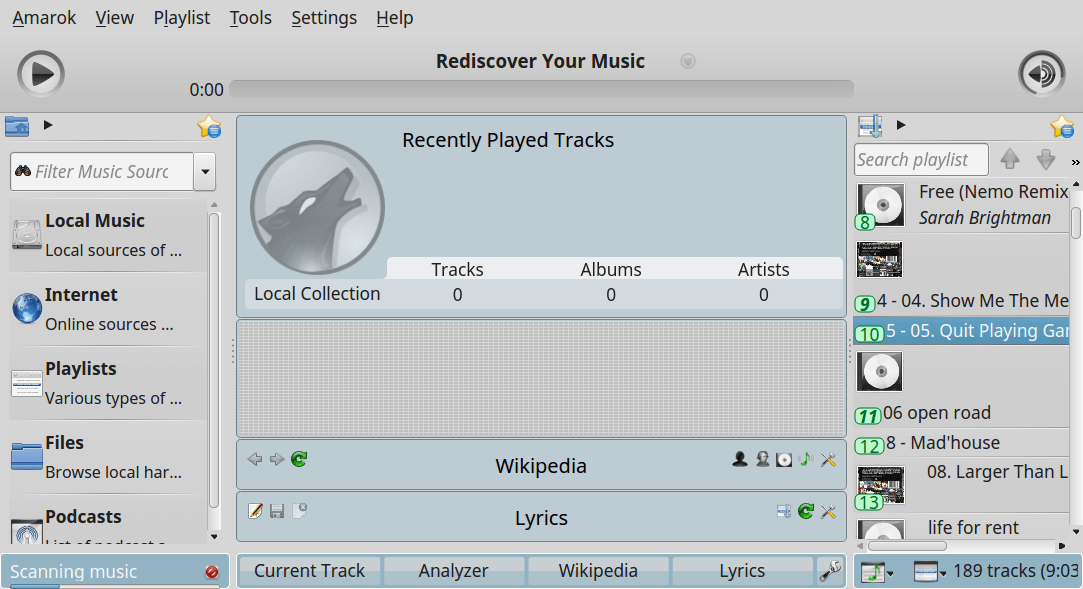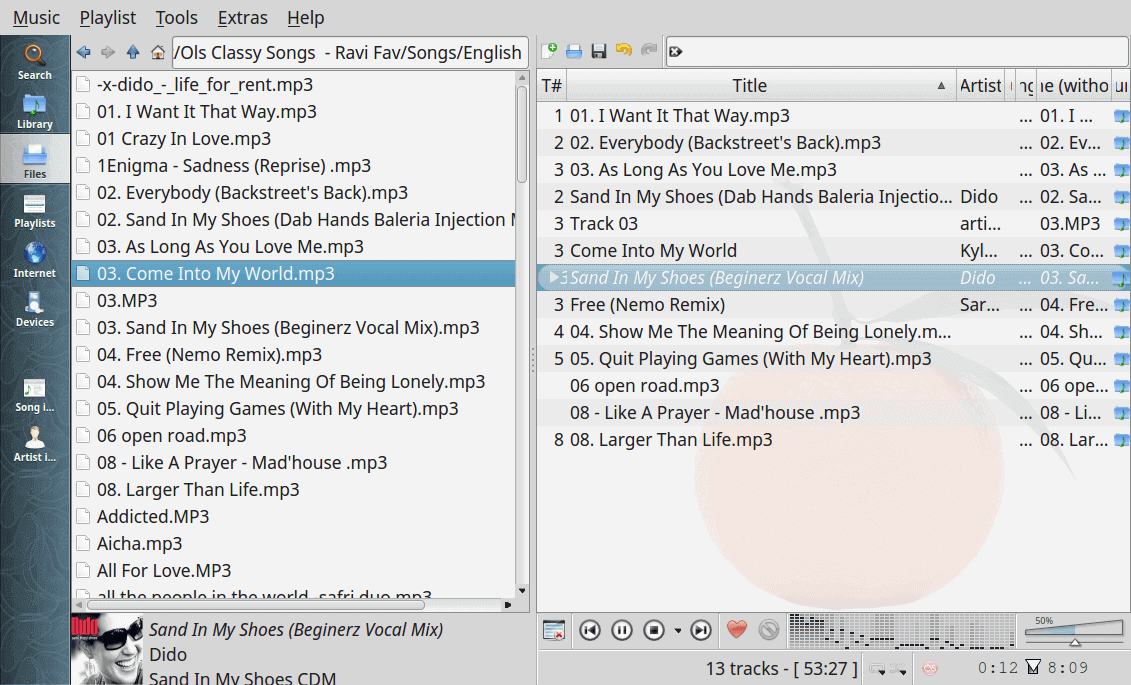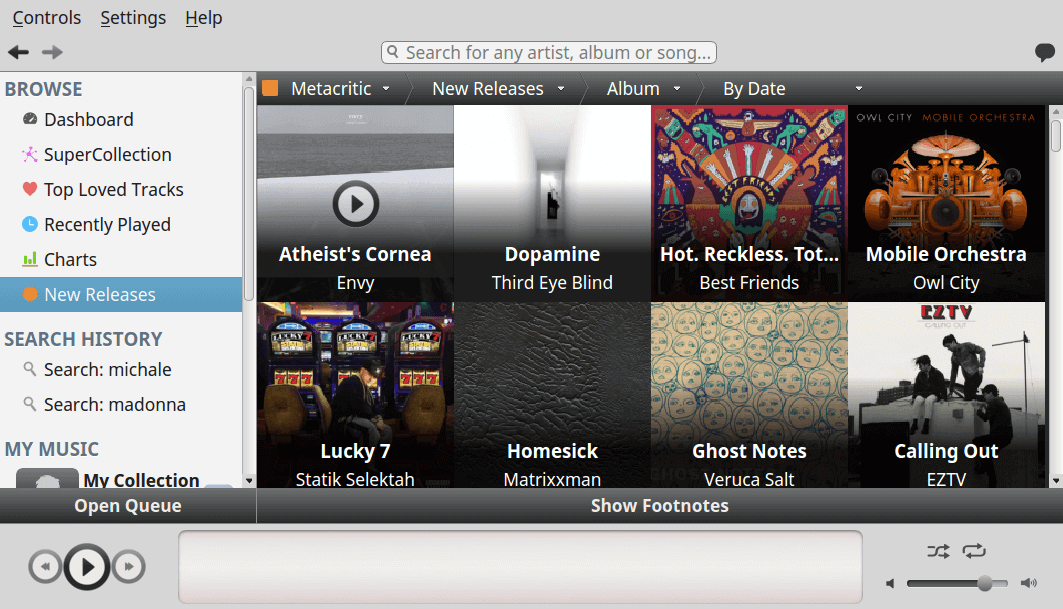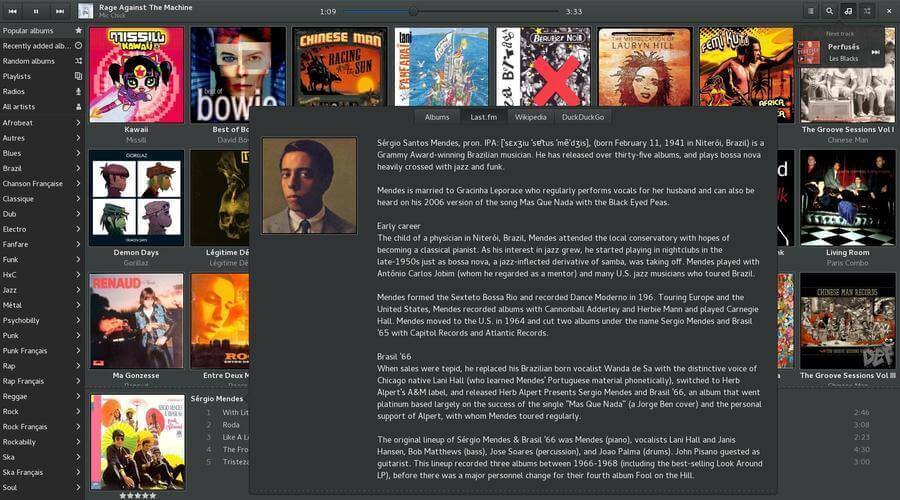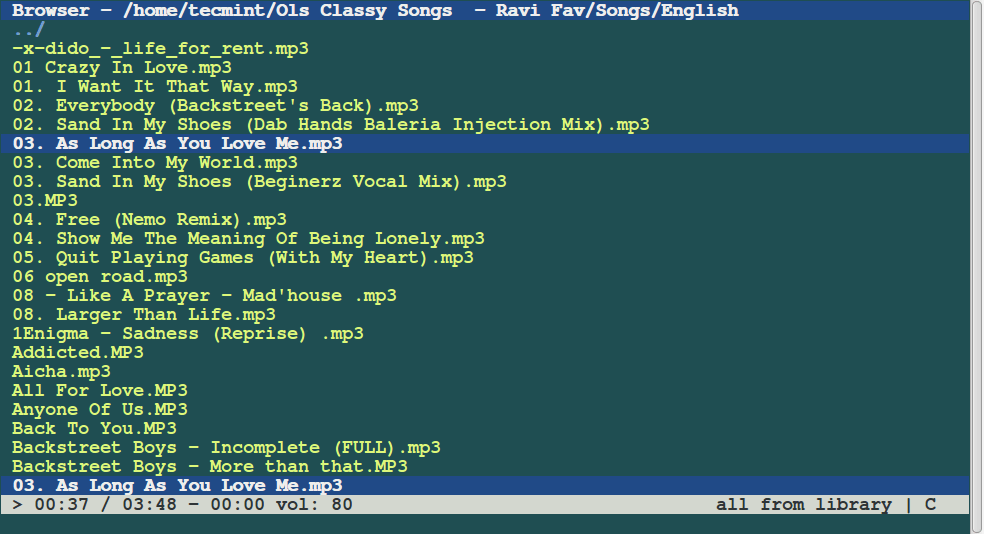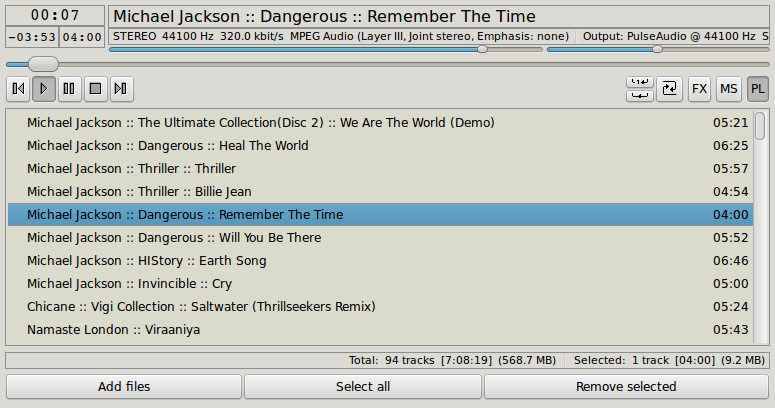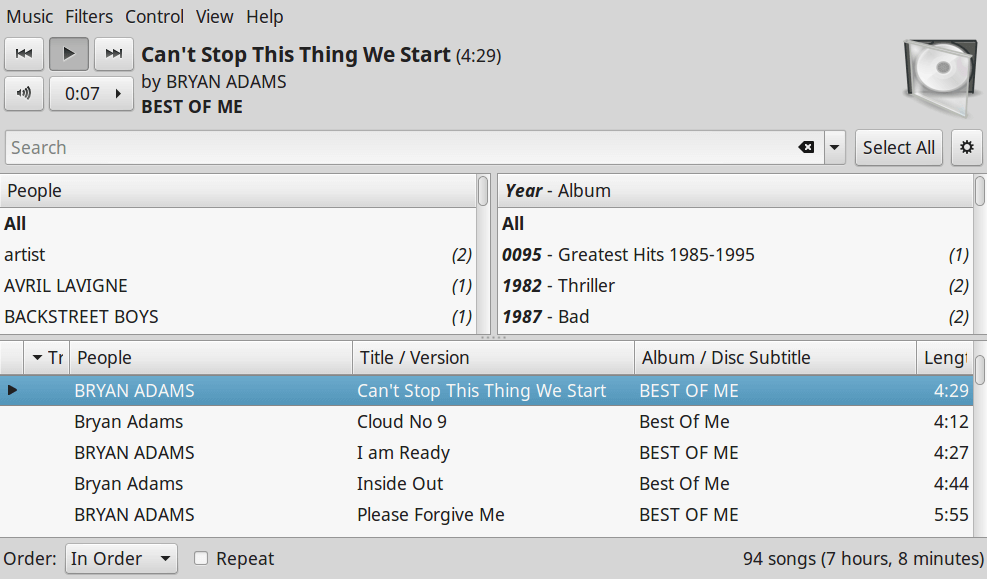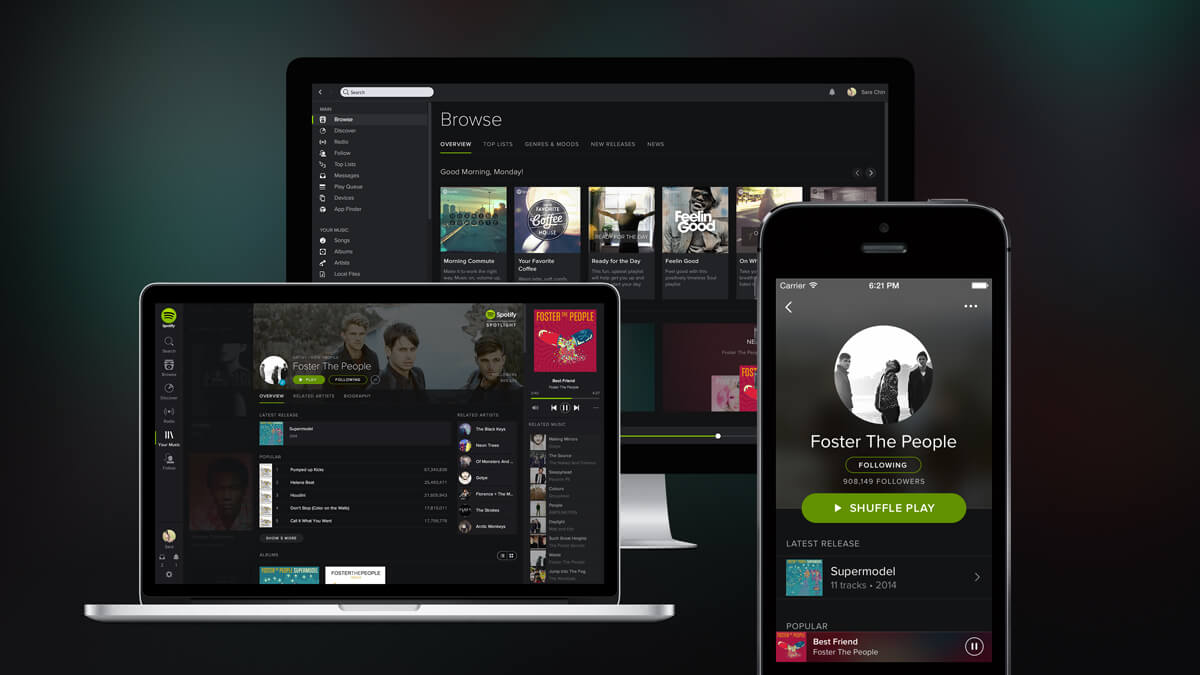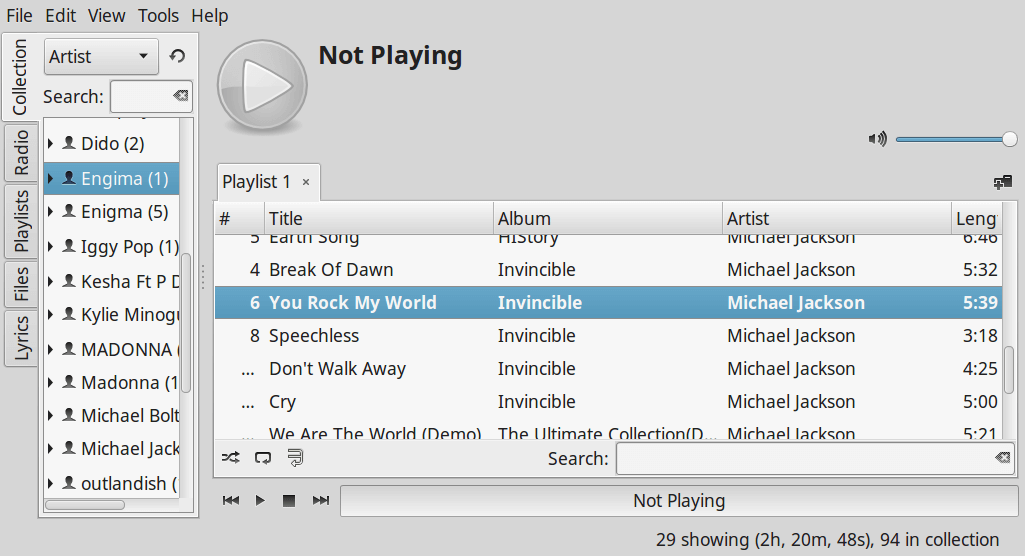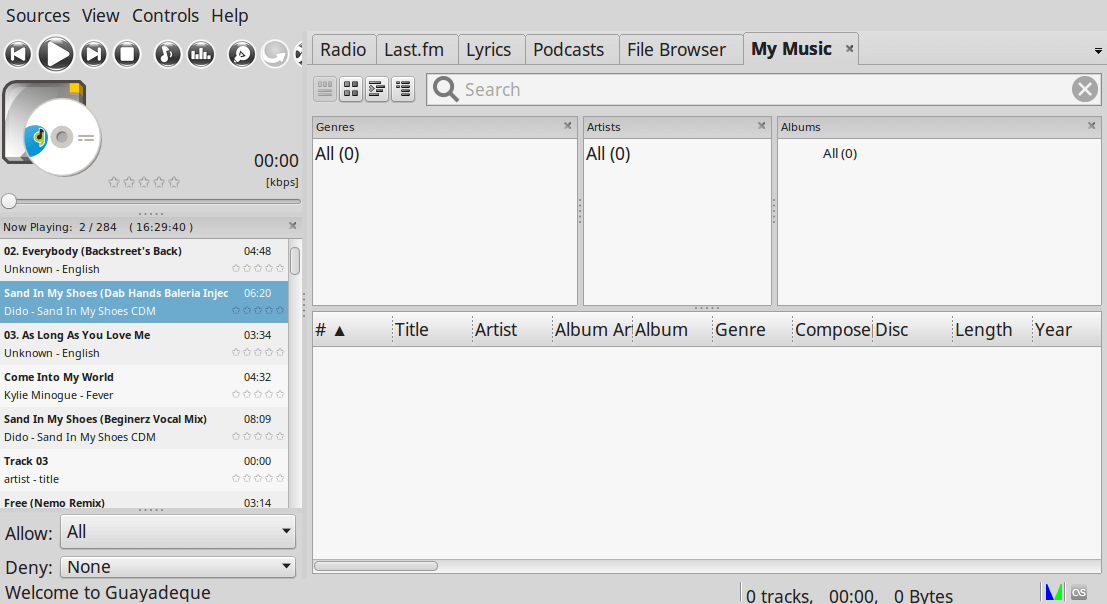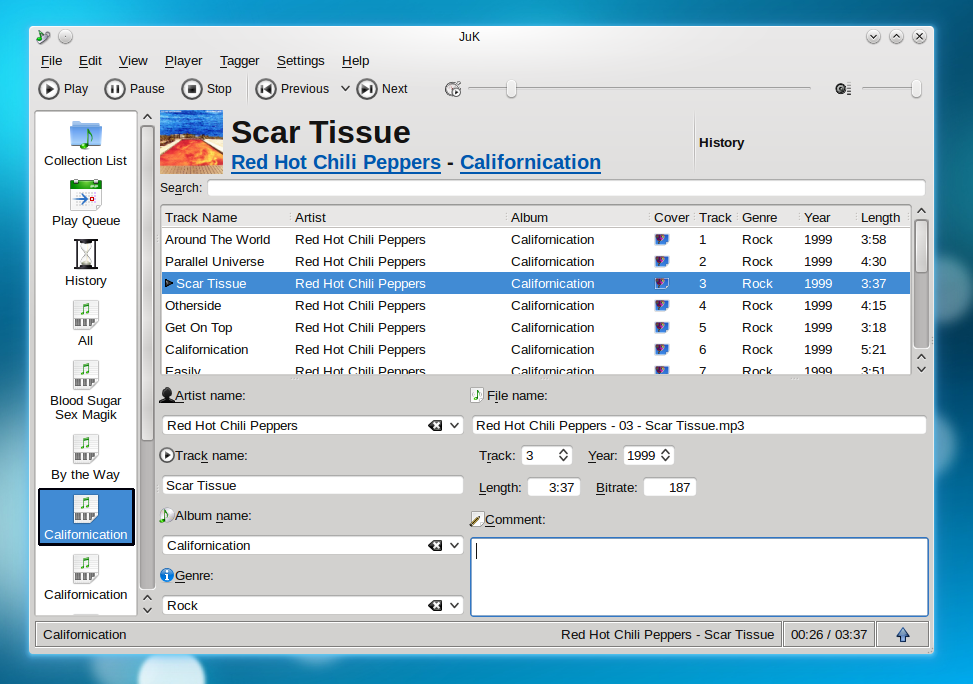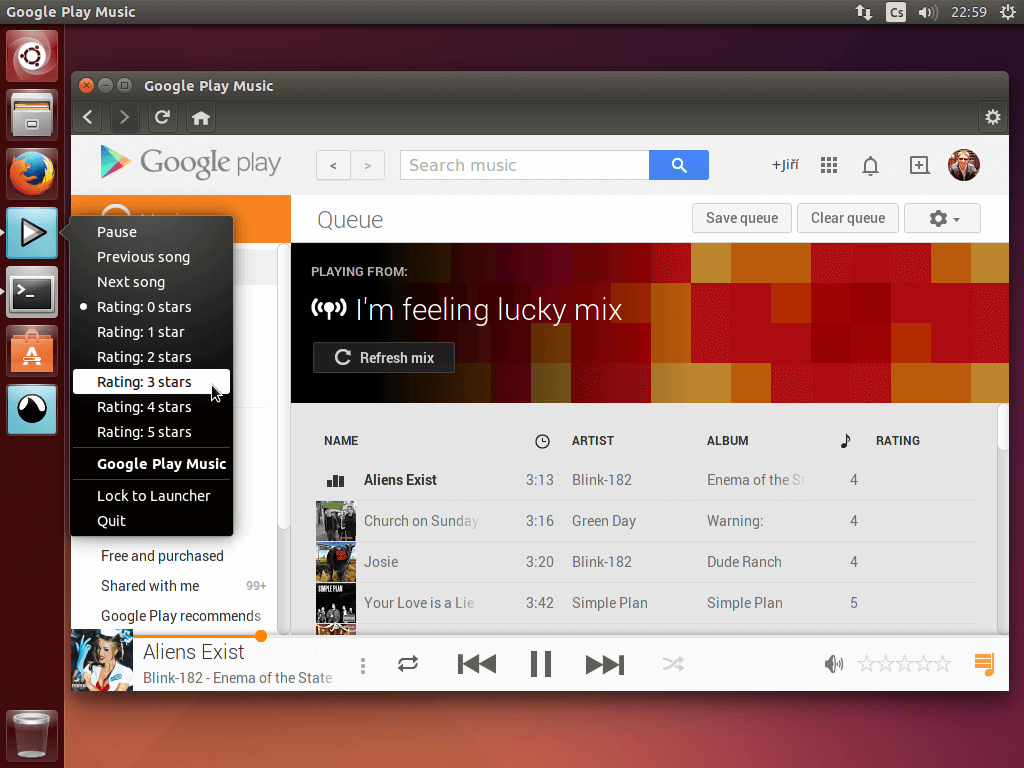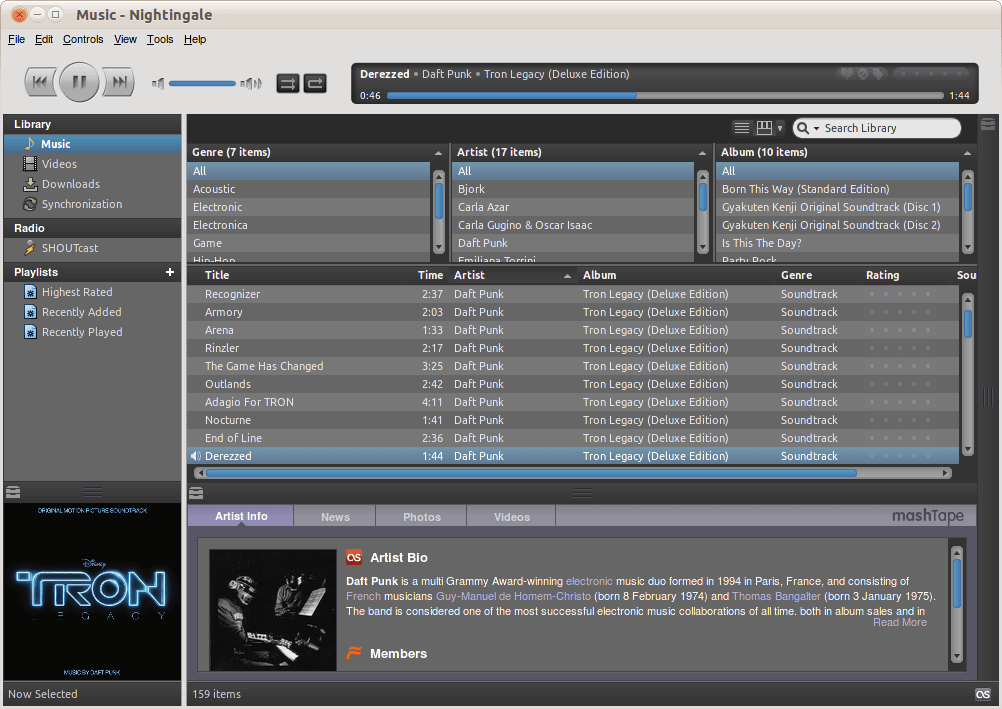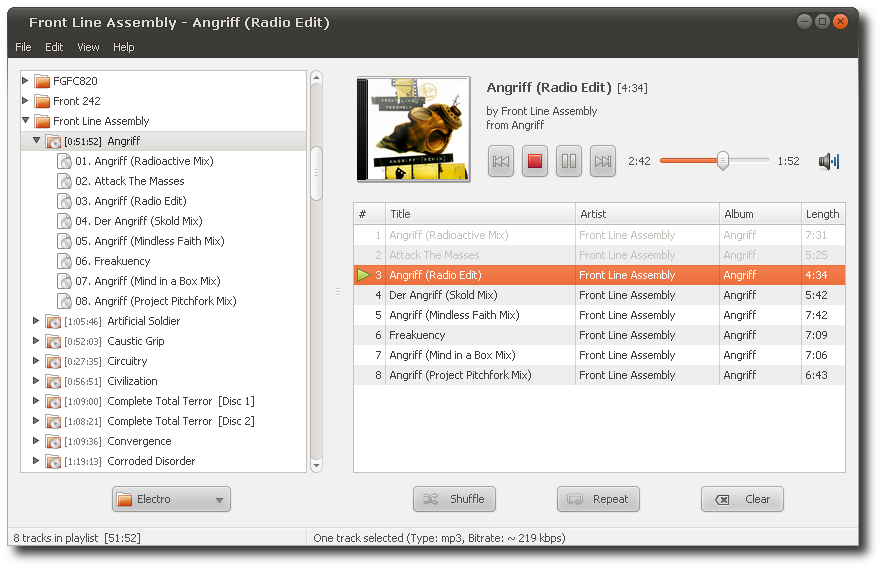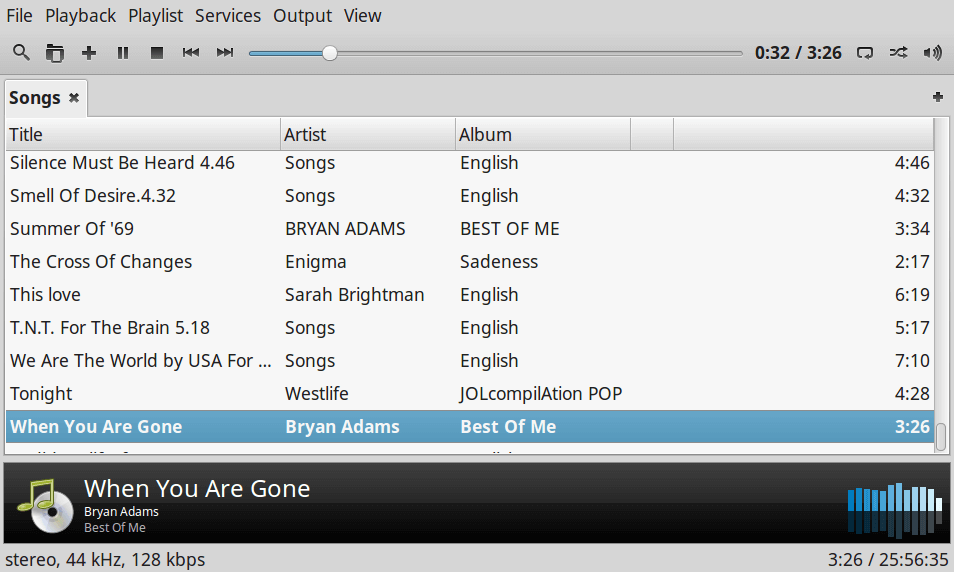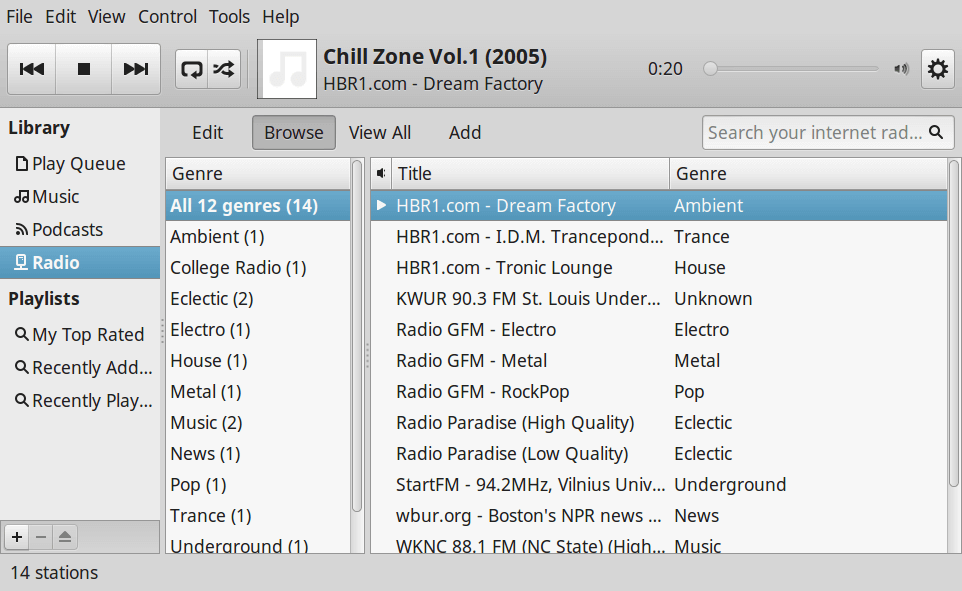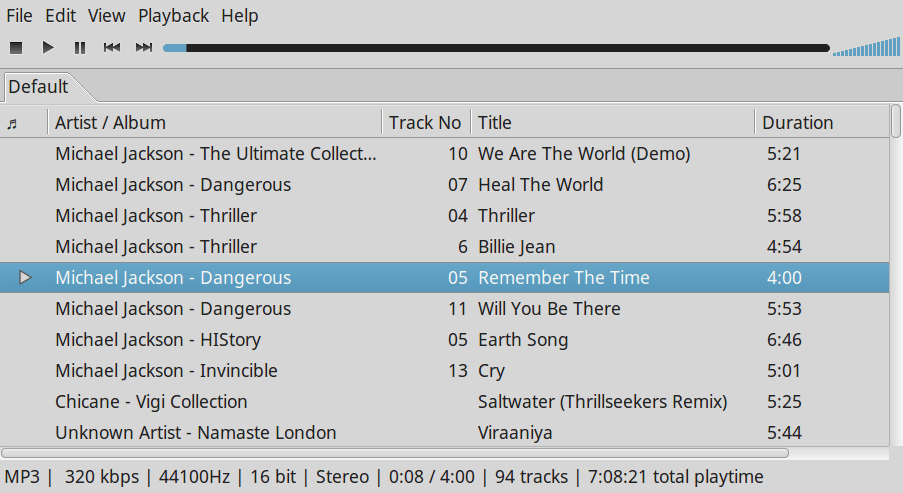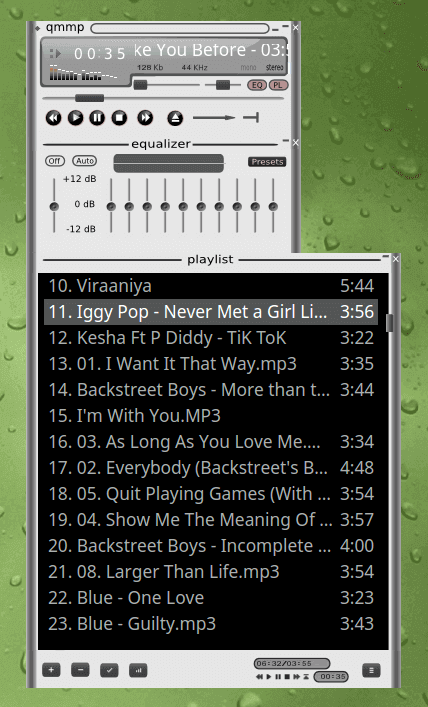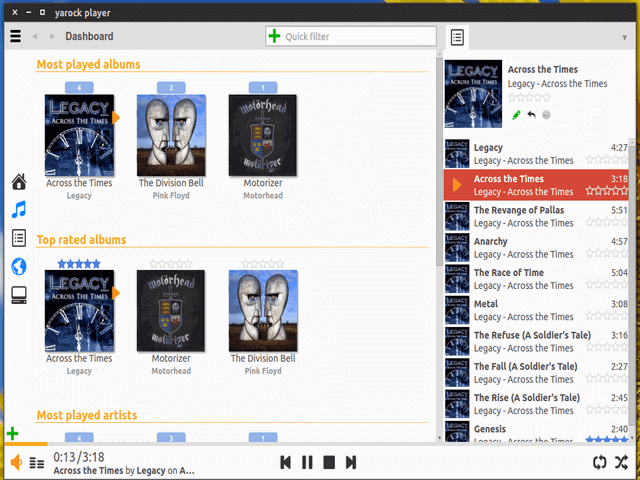Some may describe it as their passion, while some may consider it as their stress reliever, some may consider it as a part of their daily life but in every form listening to music has become an undetachable part of our lives. Music plays different roles in our lives.
Sometimes it makes us enjoy with enthusiasm, sometimes it makes us feel pleasant and good, sometimes it makes us remember someone or some feel good moments of our past. Listening to music has sustained generations, but the medium has changed.
10 Best Open Source Video Players For Linux in 2015
Earlier people relied on radio’s to listen music, while present generation has ipods, smartphones, PC and other gadgets to listen to music. Coming to PC’s we have dedicated software’s called Music Players to play our choice of song or playlist for us.
While most generation has smartphones, ipods to listen to music, these Software’s are also common source to listen to music which suits the mood for people who spent hours working on PC’s and Laptop’s and find it convenient to listen using their daily friend.
Thus, even Music Players form an important medium for countless crowd comprising students, professionals and other citizens.
Music Players and Linux
Growth of Linux as an accepted Operating System in Market was not so much few decades back, but flourishment of this Open Source Industry in IT Market from past few years has opened tremendous opportunities for a huge crowd of professionals who wanted to contribute to this industry with their work.
One such opportunity struck in very late twentieth century with need for Music Player on Linux. Since then many Music Players have been added to various Linux distributions, some as default and some as externally downloadable. Many companies, professionals have made such Music Players and have added to the repository.
Main aim for any Music Player is to support all the file formats of audio files which are supported by Windows as well as Linux and additionally support online music streaming which is trending now a days.
21 Best Music Players on Linux Till Date
Below we list some of the best Music Players created on Linux till date. A Music Player can be characterized as best after considering following features: formats supported, memory consumption, online or offline streaming of music or both, user interface design, feature-set.
Some of the music players highlighted below guarantee all the above factors while some guarantee only some factors which is the main criteria for ranking them.
1. Amarok
Amarok is a cross-platform open source software written in C++ (Qt) and released under GNU Public License.
Originally started by Mark Kretschmann as an effort to improve xmms , this software was initially named as amaroK after name of wolf and later changed to Amarok.
It can play media files in various formats but not limited to: FLAC, Ogg, Mp3, AAC, Musepack etc. Apart from playing offline collection, it can stream online music integrating with various online services like: Magnatune, Jamendo, MP3tunes, Last.fm and Shoutcast.
Amarok provides apart from basic services, few advanced features like: fetching, transferring music to or from digital music players, moodbar support, and dynamic playlist support etc.
Install Amarok
Amarok can be easily installed by using apt-get or yum package manager as shown:
# apt-get install amarok [On Debian based systems] # yum install amarok [On RedHat based systems] # dnf install amarok [On Fedora 22+ versions]
2. Clementine
Released in February 2010, Clementine is also a cross-platform software which aimed to solve criticism of many people against the transition of Amarok from version 1.4 to 2.
It is a port of Amarok version 1.4 to Qt4 and Gstreamer multimedia framework. It is also written in C++ (Qt) framework released under GNU General Public License.
With features almost same as of Amarok, it provides few extra functionalities like: Remote Control using Android device, Wii Remote, MPRIS or command-line interface.
Install Clementine
Clementine can be easily installed by using apt-get or yum package manager as shown:
# apt-get install clementine [On Debian based systems] # yum install clementine [On RedHat based systems] # dnf install clementine [On Fedora 22+ versions]
3. Tomahawk
Tomahawk is cross-platform open source music player released in March 2011. It is also written entirely in C++ (Qt) and released under GNU General Public License.
Tomahawk is a light-weight software and focuses on aggregation of music from all the sources including local, network and streaming services. Talking of UI, it has iTunes like interface.
Also, it provides access to various music services like: Spotify, Youtube, Jamendo, Grooveshark etc through various externally downloadable plug-ins. Like above music players, it also offers a basic feature-set.
Install Tomahawk
# apt-get install tomahawk [On Debian based systems] # yum install tomahawk [On RedHat based systems] # dnf install tomahawk [On Fedora 22+ versions]
Tomahawk Music Player
4. Lollypop
Lollypop is a gnome music player which is a free and open source project hosted on github. It is written entirely in Python and Gtk3.
It is very lightweight and has a very good looking User Interface with ability to play mp3, mp4, Ogg and flac files. Provides with the feature to read artist biography from Last.fm or Wikipedia, lyrics of song from Wikia.
It also provides features like: browsing through the collection using artist, album or genres, party mode effect for playing music etc. This can play only downloaded audio tracks and doesn’t allow streaming audio.
Install Lollypop Music Player
------------------ On Debian based Systems ------------------ $ sudo add-apt-repository ppa:gnumdk/lollypop $ sudo apt-get update $ sudo apt-get install lollypop
# yum install lollypop [On RedHat based systems] # dnf install lollypop [On Fedora 22+ versions]
5. Cmus
Cmus is a console based music player for Linux OS. Written exclusively in C and released under GNU General Public Liscense, this music player runs on terminal and is operated through keyboard with the help of commands prepended with the colon.
Because of being console-based, this music player is very fast to load even with huge number of songs. It has support of Ogg, Mp3, Wav, MPEG-4/AAC, WMA etc.
It enjoys all the advantages of being the console based music player but this has some effect on its user interface which is not much glossy. Apart from this, it is controllable through cmus-remote program and is known to work on many Unix like Operating Systems: FreeBSD, OpenBSD, Cygwin etc.
Read More: Install CMUS Console Based Music Player in Linux
6. Aqualung
Released in August 2015, aqualung is a cross-platform audio player originally targeted at GNU/Linux but also running on Mac OS, Windows, FreeBSD etc.
It is written entirely in C and is available for many languages including French, German, Hungarian etc. This software supports various audio file formats like: Org, Forbis, FLAC and Mp3.
The feature which makes it different from most of the music players is to play gapless music. Other features include: multi-language translation, allowing multiple playlists at same time, changing the skin at any time, support for MPEG formats and even Audio CD’s.
Install Aqualung Music Player
# apt-get install qualung [On Debian based systems] # yum install qualung [On RedHat based systems] # dnf install qualung [On Fedora 22+ versions]
7. Quod Libet
Quod Libet is an open source cross-platform music player cum tag editor. Written in Python using GTK+ and released under GNU General Public License, this software has support for Linux, Windows and OS X requiring plug-ins for Python, PyGObject including OSS and ALSA compatible audio devices.
With a great User Interface and Pango support to dynamically position the tags, it provides various other features including: dealing with audio back-ends using Gstreamer plugin, RelayGain support, option for shuffling entire playlist before repeating, rich set of features for tag editing, saving the play count of songs, downloading lyrics, fast-refreshing entire library etc.
Install Quod Libet Music Player
# apt-get install quodlibet [On Debian based systems] # yum install quodlibet [On RedHat based systems] # dnf install quodlibet [On Fedora 22+ versions]
Quodlibet Music Player
8. Spotify
It is a Swedish commercial music streaming, podcast and video service that gives full view to the user as an online audio player. It is cross-platform service which is available on almost all platforms.
Released in October 2008 by a Swedish startup Spotify AB, it got famous in hearts of 10 million+ users in no time and by June 2015, it has gathered a huge crowd amongst it which is around 75 million.
Spotify offers ability to browse or search music by artist, album, genre, playlist or record label. Spotify offers two music streaming services : Spotify Free with 160 kbit/s and Spotify Premium with speed upto 320 kbit/s.
Install Spotify Music Player
------------------ On Debian based Systems ------------------ $ sudo apt-add-repository -y "deb http://repository.spotify.com stable non-free" $ sudo apt-key adv --keyserver keyserver.ubuntu.com --recv-keys D2C19886 $ sudo apt-get update -qq $ sudo apt-get install spotify-client
------------------ On RedHat based Systems ------------------ # yum-config-manager --add-repo=http://negativo17.org/repos/epel-spotify.repo # yum -y install spotify-client ------------------ On Fedora 22+ Systems ------------------ # dnf config-manager --add-repo=http://negativo17.org/repos/fedora-spotify.repo # dnf -y install spotify-client
9. Exaile
A cross platform music player whose latest release happened to be 3.4.2 in November 2014. It uses GTK+ widget toolkit rather than Qt and is written in Python with Gstreamer media framework.
With a plain yet appealing user interface this music player holds very much similarity to Amarok for most of its functionalities Last.fm support, fetching of lyrics, editing of tags.
Also, it provides devices support via external plug-ins. Apart from these basic features, it also provides some advanced features like: ReplayGain support, Moodbar integration, previewing tracks via secondary soundcard etc.
Install Exaile Music Player
# apt-get install exaile [On Debian based systems] # yum install exaile [On RedHat based systems] # dnf install exaile [On Fedora 22+ versions]
10. Guayadeque
Guayadeque is a free and Open source audio player written in C++ and made entirely for Linux was released in March 2009 under GNU General Public License.
Guayadeque has a user interface which is analogs to Windows Player winamp and Foobar 2000 for Linux. Its features include creating and managing complex music collection, Last.fm and ReplayGain support, support for both lossless (e.g. FLAC, AIFF, AIF, APE etc.) and lossy formats like: Mp3, Ogg, mp4, m4a etc.), access to SHOUTcast, seamless playback of music collection, manage podcasts in music collection possible.
Install Guayadeque Music Player
# apt-get install guayadeque [On Debian based systems] # yum install guayadeque [On RedHat based systems] # dnf install guayadeque [On Fedora 22+ versions]
11. Juk
Another cross-platform audio player designed for Unix-like systems and Windows, JuK was released on February 2004. It is written in C++ and released under GPL.
JuK supports collection of audio files of formats like: Mp3, Ogg Vorbis, and FLAC. Some features that make it a part of the list are: Dynamic Search Playlists that are auto-updated, auto-sync feature that automatically detects new added songs to the music directory, guessing tag info by online lookup, tag-reading and editing support.
Install Juk Music Player
# apt-get install juk [On Debian based systems] # yum install juk [On RedHat based systems] # dnf install juk [On Fedora 22+ versions]
Juk Music Player
12. Nuvola Player
Nuvola Player is actually cross-platform cloud music integration for your desktop. This player is designed to have a very native look and feel but is a webapp built up of components of regular browser.
Nuvola supports Mpris v2 which means it has a sound menu support in Linux Desktop Environments. Many services work with Nuvola which are:
Bandcamp, Deezer, Google Play Music, Jango, Mixcloud, Rdio, This is my Jam and Spotify and many services are being worked upon for current and future versions like: Amazon cloud player, KEXP live stream, Synology Audio Station, Btracks.
Install Nuvola Player on Ubuntu
$ sudo add-apt-repository ppa:nuvola-player-builders/stable $ sudo apt-get update $ sudo apt-get install nuvolaplayer
Install Nuvola Player on Fedora
Add the following lines to tiliado-nuvolaplayer.repo file under software sources list at /etc/yum.repos.d/.
[tiliado-nuvolaplayer] baseurl=https://tiliado.eu/nuvolaplayer/repository/rpm/<codename>/<arch>/<component> enabled=1 gpgcheck=1 repo_gpgcheck=1 enabled_metadata=1
- Replace
<codename>as fc23, fc22 or fc21 and<arch>with with x86_64 for 64bit systems. - Replace
<component>with stable – Stable releases with new features and bug fixes.
Import PGP key.
# rpm --import http://keyserver.ubuntu.com/pks/lookup?search=0x40554B8FA5FE6F6A&op=get
Update package metadata cache.
# yum makecache fast OR # dnf makecache fast
Finally, install the nuvolaplayer.
# yum install nuvolaplayer [On Fedora systems] # dnf install nuvolaplayer [On Fedora 22+ versions]
13. Nightingale
Nightingale is a free, open source and cross-platform audio player written in C++ and released under GPLv2, MPL and BSD Licenses for Windows, Linux and OS X. It can also be considered as a web browser based on Songbird media player source code. It has more of a web browser type user interface and has ability to play multiple audio formats like: MP3, AAC, Ogg Vorbis, FLAC, WMA and Apple Lossless. Also, this player provides ability to subscribe to mp3 blogs as playlists, build custom mixes, scan computer for audio files and add them to local library. One of the very unique feature of it is collapsible GUI similar to iTunes and mini-player mode.
Install Nightingale Player on Ubuntu
$ sudo add-apt-repository ppa:nightingaleteam/nightingale-release $ sudo apt-get update $ sudo apt-get install nightingale
14. Decibel Audio Player
Decibel audio player is a free and open source audio player which is written in GTK+ and meant for GNU/Linux. It is simple yet very effective kind of a music player. It has a very clean interface with all the required set of features and no extras, but apart from that it is rich in feature-set and offers great deal of features.
Some of them include: full right to user to disable the feature he doesn’t need which makes it probably one of the most memory efficient one, tagging of files or burning CD’s. It has three modes which are: full, playlist and min. Above all, it offers many features which are not directly available but, they are available via plug-ins.
Install Decibel Audio Player
# apt-get install decibel-audio-player [On Debian based systems] # yum install decibel-audio-player [On RedHat based systems] # dnf install decibel-audio-player [On Fedora 22+ versions]
15. MPD
MPD is another music player which is also written in C++, released in February 2015 and available for Unix-like OS and Windows and released under GPL.
Apart from all music players discussed till now, this is a daemon server which runs in background which needs a client for interaction. This music player once initiated, a daemon runs in background which uses the database of audio files kept in-memory and any local client can playback audio files after connecting to server via Sockets.
MPD can recognize large number of audio file formats including: Ogg, Vorbis, FLAC, Opus, WavPack, MP3, MOD etc. This Daemon behavior of this music player server although takes UI feature from it, but provides it with various other features like: Buffer support for playback, Seeking and Crossfading support, remotely controlling the daemon over the network, support for ALSA, OSS, JACK, MVP, PulseAudio, OS X and Windows.
It also has clients which have user interface but it is kept to very simple one.
Install MPD Music Player
# apt-get install mpd [On Debian based systems] # yum install mpd [On RedHat based systems] # dnf install mpd [On Fedora 22+ versions]
16. Audacious
Primarily designed for POSIX-compatible platforms like Linux with added support to Windows, Audacious is an open source audio player and default music player for Lubuntu and Ubuntu Studio. It is entirely written in C++ with latest version being 3.4 released in June 2013.
Audacious is one of the players with wide variety of features, most of which are available through external plugins namely: Decoder, Transport, Output, Effect plugin etc. Apart from this, it has support for wide variety of codecs namely few of which are: Mp3, FLAC, Wavpac, TTA, Shorten, MIDI etc.
It has full support for Winamp 2 skins and with all skins usually rendered in png format, it allows users to render the skins adjusting the RGB color balance by themselves. Even after being a standalone player, it accepts connection from client software’s like: Conky.
Install Audacious Music Player
# apt-get install audacious [On Debian based systems] # yum install audacious [On RedHat based systems] # dnf install audacious [On Fedora 22+ versions]
17. Rhythmbox
Written in C and released for Unix like systems like: BSD, GNU/Linux and Solaris, Rhythmbox is an audio player that plays and helps organize digital music. It is a default music player for Ubuntu Linux system. Works well under GNOME desktop environment with GStreamer media framework.
With a good looking user interface, Rhythmbox provides various features like: gapless playback, Last.fm support through which it can stream online music, Audio CD burning, Music importing. It can integrate into countless number of platforms very efficiently. Versions of Rhythmbox above 0.10.0 support DAAP sharing. Additionally it uses udev subsystem of Linux to detect the device chosen for playing music.
Install Rhythmbox Music Player
# apt-get install rhythmbox [On Debian based systems] # yum install rhythmbox [On RedHat based systems] # dnf install rhythmbox [On Fedora 22+ versions]
18. DeaDBeeF
Written in C, DeaDBeeF is a lightweight but powerful music player released under GPLv2 for Linux and Android. Most of external plugins supported by DeaDBeeF are written in C++ and interface uses GTK2.
One of the major advantage it holds above many audio players is low memory consumption. It can play large number of formats including but not limited to: mp3, ogg, wav, m4a etc.
Other notable features include: Online and Offline streaming of music, 18-band equalizer support, gapless playback, Cuesheet support, Last.fm support etc.
Install DeadBeeF Music Player
# apt-get install deadbeef [On Debian based systems] # yum install deadbeef [On RedHat based systems] # dnf install deadbeef [On Fedora 22+ versions]
DeaDBeeF Music Player
19. MOC (Music On Console)
MOC is another text-only music player somewhat similar to what we saw in MPD but with some changes. Written in C and based on ncurses, this console audio player is specially written for Linux/Unix based systems. It was written originally by Damian Pietras and now being maintined by John Fitzgerald.
The console-based feature of this audio player comes with many advantages which are: simple yet powerful interface, low memory utilization. Apart from this it has seperate thread for output buffer which helps it avoid high load situations.
MOC has customizable interface layouts and supports ALSA, OSS and JACK outputs. Like MPD, it also has a client/server architecture but doesn’t support remote network accessibility by any graphical client.
Install MOC Music Player
# apt-get install moc [On Debian based systems] # yum install moc [On RedHat based systems] # dnf install moc [On Fedora 22+ versions]
20. Qmmp Music Player
It is a cross-platform Qt based audio player similar to Audacious and Winamp. It is easily available for almost all Linux Distros without compilation unless you need the latest build.
It supports wide variety of audio formats including: FLAC, Ogg Vorbis, MPEG-1, AAC, etc. Along with support to cuesheets. It can have skins similar to Winamp and even you can customize your skins.
It supports Volume Normalization which is a built-in option. Many other features can be availed in this player using external plugins. Other features include; Last.fm support, ReplayGain support, viewing lyrics, crossfade, support for ALSA, OSS and JACK audio outputs.
Install Qmmp Music Player
# apt-get install qmmp [On Debian based systems] # yum install qmmp [On RedHat based systems] # dnf install qmmp [On Fedora 22+ versions]
21. YAROCK Music Player
YAROCK is a music player exclusively for Linux platform. It is written in C++ and Qt and using Phonon multimedia framework. Its mordern looks and minimal dependencies and support for different audio back-ends makes it be in this list of best music players.
It has MPRIS 2 interface which provides basic playback control, tracklist control. Also, it supports command-line interface. YAROCK supports variety of music formats like: MP3, Ogg, Vorbis, FLAC, WMA.
Other features include: ReplayGain support, support for multiple music collections, integration with services like: Last.fm, Echonest, DiscoGs, providing user with useful information like: lyrics, artist biography, albums context and covers etc.
Install YAROCK Music Player in Ubuntu
$ sudo apt-get install build-essential cmake libqt4-dev libtag1-dev libqjson-dev libphonon-dev libvlc-dev mpv $ wget https://launchpad.net/yarock/1.x/1.1.4/+download/Yarock_1.1.4_source.tar.gz $ cd Yarock_1.1.4_source/ $ mkdir build && cd build $ cmake .. $ make $ sudo make install
Conclusion
We have made this list based on our research. If you think of any other music player on Linux which should have been listed here then you can mention its name in the comments.


